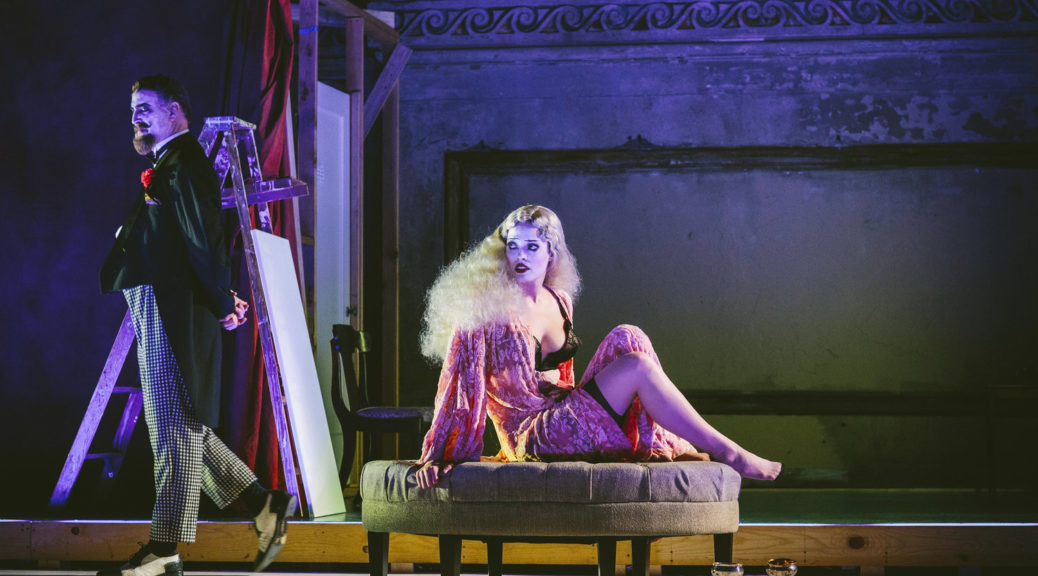
BERG’S OPERA ‘LULU’ IN OAKLAND
Daring, Imagination Carry off Modest Staging
Oakland? “Lulu” in Oakland?
Yes, Virginia, there really is action and daring culture in Oakland, even in the summer doldrums, to judge by the rousing and highly suggestive opera “Lulu” by Berg played in an abandoned railway station by the great risk-takers at West Edge Opera. Naturally, it was a wall-to-wall sellout, 500 fans a night.
Fear not, West Edge—-your risks are well taken. Neither a tough-as-nails part of West Oakland nor nearby condemned structures deterred the WEO in taking on this most jarring 20th-century opera that few troupes dare to approach. The music is in 12-tone mode, excruciatingly dissonant except in the hands of a master like Alban Berg, whose many astute structural symmetries are better appreciated when spotted in the score.
The ill-fated Lulu’s coloratura outbursts and screams reach high above the staff. And worse yet, Lulu is the naughtiest and most irresistible woman in all opera, a sexual beast attracting men like flies, making even Salome seem like a prim homebody by comparison.
Seen piecemeal, the opera is lascivious. In the bigger picture however, its tale is quite moralistic, given the devastating decline and fall of the ill-fated Lulu, by then a tawdry prostitute dispatched by Jack the Ripper. The opera is also a social critique, wherein those in power can do whatever they want with abandon.
Despite the makeshift hall-turned-theater, this “Lulu” provided a high point of the summer with its vivid theater. Its characters were partly in white-face to convey aspects of the circus, as spelled out in the metaphor of the prologue, comparing Lulu and her crowd to the animals of the Big Top.
The star of the night was coloratura Emma McNairy in the title role, willing to do anything to activate her role, even if it took appearing in the altogether more than once. Her stunning svelte figure was ideal for the role, and her voice was appealing and electric, seemingly with no upper bound.
Handling the German and the musical complexities were Lulu’s men: Philip Skinner (Dr. Schoen), Alexander Boyer (Alwa), Boyan Knezevic (Schigolch). Buffy Baggott played Lulu’s hanger-on, Countess Geschwitz, one of the first lesbians in opera—-surely a radical figure for a 1937 world premiere in Europe.
Jonathan Khuner, who had lobbied hard to get “Lulu” staged here, conducted the orchestra, remarking afterward, with understandably pride, “It’s challenging for the performers. But also challenging for the audience.”
MUSIC NOTES—For decades, the score of the last act of “Lulu” was kept locked away by the composer’s widow Helene. Its orchestration has been completed by Friedrich Cerha. When it all finally came to light after her death, musicologist George Perle discovered the likely reason: The initials of Alban Berg’s mistress Hanna Fuchs-Robettin, H F, were all over the score in musical notes. He called her “my great love.”
Berg’s “Lulu,” in German, by West Edge Opera, part of three-opera package July 25-Aug. 8. At the abandoned R.R. Station, 1401 Wood St., Oakland. For info on WEO: go online.
©Paul Hertelendy 2015
#
Paul Hertelendy has been covering the dance and modern-music scene in the San Francisco Bay Area with relish — and a certain amount of salsa — for years.
These critiques appearing weekly (or sometimes semi-weekly, but never weakly) will focus on dance and new musical creativity in performance, with forays into books (by authors of the region), theater and recordings by local artists as well.
#